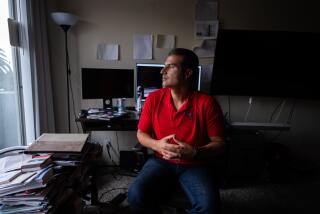Kuwait Escape--a Portrait of Terror : Freedom: Southland banker was confronted by Iraqi soldiers on his desert gamble but bluffed his way past them. He is reunited with his wife and two children at LAX.
Three weeks and one aborted escape after Iraqi soldiers seized his neighborhood in Kuwait, Southern California banker Abdalla (Tony) Touny thought his gamble for freedom would explode, literally, in his face.
It was shortly after 3 a.m. on Aug. 21 and Touny, a friend and two men he described as Bedouin “guides” were driving northwest through the desert, bound for the safety of Jordan.
“They stopped us,” Touny said, referring to the Iraqi soldiers. “They almost killed us. They surrounded us with machine guns. They were checking for Americans and Kuwaitis. I told them (in Arabic), ‘I’m a bookkeeper, I’m a clerk.’ I told them I was Egyptian.”
After a few more harrowing minutes the Iraqis relented--and Touny was headed toward becoming one of only a few Americans in Kuwait to flee the grip of Saddam Hussein.
“It scared the hell out of me,” Touny said Friday during an interview in Newport Beach.
Aided by goodwill cigarettes he passed to Jordanian border guards, along with the savvy and cachet of the Bedouins, to whom Touny said he paid a $750 fee, he made it into the capital city of Amman, Jordan, at about 10 that same morning.
In the wee minutes of Friday morning, Touny was reunited at Los Angeles International Airport with his wife, 13-year-old daughter and 18-year-old son. A few hours later Touny recounted his odyssey to freedom at the family’s temporary apartment in Newport Beach.
Touny, 46, provided a uniquely informed perspective on the Persian Gulf crisis. An Egyptian by birth but an American citizen since 1974, Touny earned his master’s degree at New York University and for the last three years has been the chief manager of operations for the Bank of Kuwait and the Bank of the Middle East.
Touny said he has supervised the accounts of members of the Kuwaiti royal family. The palace of the monarch of Kuwait, he said, was on grounds behind the rented villa where he lived.
Based on his relationship with members of the royal family, Touny said he thinks the Kuwaitis would be willing to pay Hussein “whatever money he wants” to withdraw.
Touny’s brush as a captive of the Iraqis was tinged with no small amount of irony. The Touny family had been spending the summer in Newport Beach, as they try to do every year, when he returned by himself to the tiny Middle Eastern nation on Aug. 2.
“I was exhausted,” Touny recalled, “I had not slept for about 24 hours. So, when I got to my villa (at about 2 a.m.), I went to bed.”
But two hours later, the phone rang. It was his wife, Abla, watching television half the world away in Newport Beach.
“She told me there was a war,” Touny said. “I couldn’t believe it.”
By daybreak, Touny had no doubt. He could hear the explosions and see the flashes.
“I ran to the ATM machines (at the bank), and they were closed,” Touny said, adding that he had flown to Kuwait the night before with only the equivalent of $36 American dollars in his pockets.
After borrowing money from friends, Touny said he was part of a surge of immediate panic buying. He said he stood in line two hours that first day to buy canned goods, rice, bread, powdered milk and cheese.
Because of the proximity of the Kuwaiti emir’s royal palace, the Iraqi troops were quickly a presence in his neighborhood, looting homes and controlling access in and out at gunpoint.
“There were a lot of Iraqi actions in my neighborhood,” he said. “I tried to be low-key and stay out of their sight.”
About one week later, when he and friends tried to escape by car to Saudi Arabia, Iraqi troops stopped and ordered them back to Kuwait city. By that point, he had long since lost phone contact with the United States and his family.
“We kept calling the State Department every single day,” said Abla Touny, a chemist who had hoped to return to her job at Kuwait University. “I was really going crazy. I mean, it was just a nightmare.”
Meanwhile, Tony Touny said he and other Americans kept in daily contact with the American Embassy in Kuwait, whose officials warned them not to try another escape through Saudi Arabia. Until the time he fled Kuwait, Touny said he saw the results of car bombing and other anti-Iraqi, guerrilla-type activity.
“There was a lot of Kuwaiti resistance, even right before I left,” Touny said.
From his perspective, Touny said, Hussein’s motive for invading and occupying Kuwait is simple. Iraq, he said, is “a bankrupt country. They’re looking for someone to bail them out. They want the money. And they want access to the (Persian) Gulf.”
As for himself, Touny said he will begin seeking a safe, stateside job.
“I can’t risk my life anymore,” he said.
More to Read
Sign up for Essential California
The most important California stories and recommendations in your inbox every morning.
You may occasionally receive promotional content from the Los Angeles Times.











